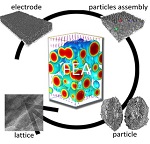Vol. 19, No. 10 - June 2019
View the Archives

Science Highlight Quantification of Heterogeneous Degradation in Li-ion Batteries – Contacts: Yijin Liu (SSRL), Kejie Zhao (Purdue University), Feng Lin (Virginia Tech), and Yang Yang (BNL) The development of better rechargeable batteries for consumer electronics and electric vehicles is difficult due to the complex interplay of many chemical, spatial, and temporal factors. Taken together, these factors are called the chemomechanical interplay, which includes chemical degradation, chemical heterogeneity, and mechanical stress that cause the battery to lose functionality over many charging and discharging cycles. A team of researchers has developed a combined methods approach that allows quantification of the processes of chemomechanical interplay over diverse length and time scales. Read more... Nominations for SSRL Annual AwardsRecognize outstanding achievements of your colleagues, postdocs, students (or yourself) by submitting nominations for the following awards by the posted deadlines. Send nomination packages for these awards to Cathy Knotts. William E. and Diane M. Spicer Young Investigator Award – Deadline to submit nominations extended until July 5: The $1,000 Spicer Young Investigator Award honors the professional and personal contributions that William E. and Diane M. Spicer made to our community. Submit nomination packages including a letter summarizing the scientific contributions of the candidate as well as their CV and publications (supporting letters also encouraged). Award Site Melvin P. Klein Scientific Development Award – Submit nominations by August 1: This $1,000 award honoring Mel Klein's many contributions recognizes research accomplishments of undergraduate/graduate students or postdoctoral fellows within three years of receiving their Ph.D. This award provides peer recognition and helps to promote dissemination of results based on work performed at SSRL. The nomination package should include the candidate’s CV, letters of recommendation from the advisor and colleagues, as well as an abstract written by the candidate describing the SSRL related experiments, scientific results, and plans to present the findings. Award Site Farrel W. Lytle Award – Submit nominations by August 5: The $1,000 Lytle Award was established to promote technical or scientific accomplishments in synchrotron radiation-based science and to foster collaboration and efficient use of beam time at SSRL. SSRL users and staff are eligible to be nominated for the Lytle Award. Letters of nominations should include a summary of the individual's contributions and why they should be recognized through this award. Supporting letters are welcome. These awards will be presented at the SSRL/LCLS Annual Users’ Meeting, and the recipients of the Klein and Spicer awards will be asked to present their research during the plenary session of the Users' Meeting on September 26. EventsStanford-SLAC Cryo-EM Center (S2C2) Modeling Workshop - July 10-12, 2019 This workshop covers the basic principles and practical protocols to obtain atomic models based on cryo-EM density maps at near atomic resolution. See agenda Joint SSRL/LCLS Users’ Meeting September 24-27, 2019 Mark your calendar and plan to attend the SSRL/LCLS Annual Users’ Meeting, September 24-27, 2019 which will also include facility updates, a DOE BES update, invited talks, and several focused workshops including:
More details and registration information will be posted to the website soon. EMSL Integration 2019 – Plants, Soil and Aerosols: Interactions that tell stories of Ecosystems, Climate and National Security” October 8-10, 2019 announcement User Research AdministrationBeam Time Requests
(See SSRL Proposal & Scheduling Guidelines) Submit beam time requests and proposals through the User Portal. _____________________________________________________________________ The Stanford Synchrotron Radiation Lightsource (SSRL) is a third-generation light source producing extremely bright x-rays for basic and applied research. SSRL attracts and supports scientists from around the world who use its state-of-the-art capabilities to make discoveries that benefit society. SSRL, a U.S. DOE Office of Science national user facility, is a Directorate of SLAC National Accelerator Laboratory, operated by Stanford University for the U.S. Department of Energy Office of Science. The SSRL Structural Molecular Biology Program is supported by the DOE Office of Biological and Environmental Research, and by the National Institutes of Health, National Institute of General Medical Sciences. For more information about SSRL science, operations and schedules, visit http://www-ssrl.slac.stanford.edu. To unsubscribe from SSRL Headlines, just send an e-mail to listserv@slac.stanford.edu with "signoff ssrl-headlines" in the body. To subscribe, send an e-mail to listserv@slac.stanford.edu with "subscribe ssrl-headlines" in the body. Questions? Comments? Contact Lisa Dunn
|
